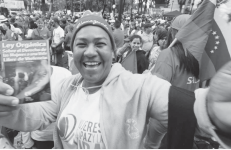Artikel
A Preview of the Future
Workers’ Control in the Context of a Global Systemic Crisis
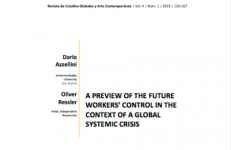
One of the ‘concrete utopias’, as Ernst Bloch called them, realistic possible concepts for a better world, that can already be found in the here and now, are ‘recuperated companies’. Focusing on the examples of the worker-controlled factories RiMaflow in the industrial periphery of Milan and Officine Zero in Rome this text allows a glimpse of how society could be organised differently.
Elezioni presidenziali in Venezuela, 20 maggio 2018
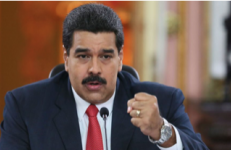
I primi risultati preliminari annunciati dal Consiglio Nazionale Elettorale del Venezuela danno il presidente Nicolás Maduro come vincitore delle elezioni presidenziali con il 68% dei voti con una partecipazione elettorale tra il 46 e il 48%. Maduro ha ricevuto 5.823.728 voti. Il principale candidato dell’opposizione Henri Falcón ha raggiunto il 21%, 1.820.552 voti, l’oppositore evangelico Javier Bertucci 925.042 voti e il candidato della sinistra trotzkista di opposizione Reinaldo Quijada ha ricevuto 34.614 voti.
Elecciones presidenciales en Venezuela, 20 de mayo 2018
"Quien descalifica el resultado electoral, quien no lo entiende, no entiende a Venezuela“
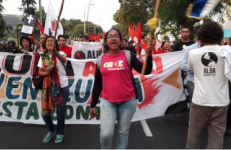
Los primeros resultados preliminares anunciados por el Consejo Nacional Electoral (CNE) en Venezuela dan al presidente Nicolás Maduro como ganador de las elecciones presidenciales con un 68% de los votos y con una participación electoral entre el 46 y 48%. Maduro recibió 5.823.728 votos. El principal candidato opositor Henri Falcón juntó un 21%, 1.820.552 votos; el opositor evangélico Javier Bertucci 925.042 votos y el candidato de la izquierda opositora trotskista Reinaldo Quijada, recibió 34.614 votos.
Dario Azzellini zu den Wahlen in Venezuela, der Kritik von Basisaktivisten an der Regierung und warum sie dennoch Maduro gewählt haben
"Wer das Wahlergebnis disqualifiziert, wer es nicht versteht, versteht Venezuela nicht"
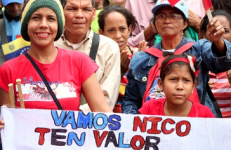
Dem zweiten offiziellen Bulletin vom Nationalen Wahlrat in Venezuela gemäß ging Präsident Nicolás Maduro als klarer Sieger der Präsidentschaftswahlen hervor. Er erhielt 67,76 Prozent der Stimmen bei einer Wahlbeteiligung zwischen 46,02 Prozent (bei 98,7 Prozent ausgezählten Stimmen). Maduro kam auf 6.190.612 Stimmen.
Entrevista con Dario Azzellini
Comunas y control obrero en Venezuela
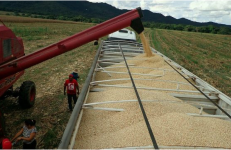
“Las comunas deben ser el espacio sobre el cual vamos a parir el socialismo”, son palabras pronunciadas por Hugo Chávez en uno de sus famosos programas de radio “Aló presidente”. Hemos entrevistado a Dario Azzellini* para hablar de las comunas venezolanas y de las nuevas formas de participación, así como de sus éxitos, dificultades y contradicciones. Dario Azzellini ha investigado y documentado estos temas a lo largo de toda la Revolución Bolivariana. Haymarket Books acaba de publicar en edición de bolsillo su libro Communes and Workers’ Control in Venezuela.
Entrevista a Dario Azzellini
Desafiar el capitalisme per mitjà del control obrer, Per què és important el control obrer?
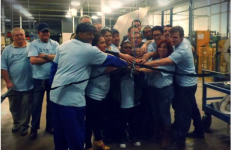
Una característica comuna de cada situació de crisi, des dels aixecaments de principis del segle XX fins a les reestructuracions neoliberals de la fi d'aquest mateix segle, és l'aparició del control obrer: els obrers s'organitzen per fer-se càrrec dels seus llocs de treball per tal de defensar els seus llocs de treball i les seves comunitats.
Entrevista con Dario Azzellini
Desafiar al capitalismo por medio del control obrero
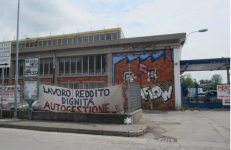
Una característica común de cada situación de crisis, desde los levantamientos de principios del siglo XX hasta las reestructuraciones neoliberales de finales de ese mismo siglo, es la aparición del control obrero: los obreros se organizan para hacerse cargo de sus lugares de trabajo con el fin de defender sus puestos de trabajo y sus comunidades.
Interview avec Dario Azzellini
Communes et contrôle ouvrier au Venezuela
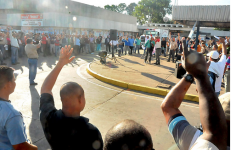
“Les communes devraient être l’espace dans lequel nous allons donner naissance au socialisme” – tels étaient les mots de Hugo Chávez dans une de ses fameuses émissions présidentielles. Pour discuter des communes vénézuéliennes et des nouvelles formes de participation, ainsi que de leurs succès, difficultés et contradictions, nous avons interviewé Dario Azzellini *. Il a étudié et documenté ces questions tout au long de la révolution Bolivarienne. Son livre «Communes and Workers’ Control in Venezuela » a récemment été publié en livre de poche par Haymarket Books.
Dario Azzellini em: Movimentos Sociais e Crises contemporâneas, Vol. 3, Editado por Alves de Lima Filho, Paulo; Tahan Novaes; Henrique; Macedo, Rogério
“Toma de empresas y gestión bajo control obrero en Europa como respuesta a la crisis”
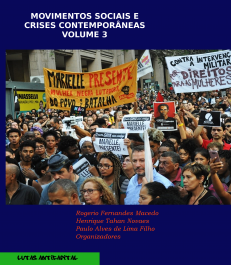
„Poderíamos dizer que este volume trata dos processos de transformação social sob o capital, contra ou a favor dele, das suas transições socioeconômicas no sentido da emancipação da classe trabalhadora quanto do capital, neste quadrante histórico de reversões conexas e complexas. A captura desses três ricos processos se dá em grande estilo, possibilitando ao leitor e alunos uma rica e apaixonante leitura de tão vitais processos.
interview with Dario Azzellini
Communes and Workers’ Control in Venezuela
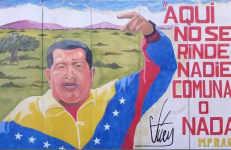
“The communes should be the space in which we are going to give birth to socialism.” – these were the words of Hugo Chávez in one of his famous presidential broadcasts. To discuss the Venezuelan communes and the new forms of participation, as well as its successes, difficulties and contradictions, we have interviewed Dario Azzellini*. He has investigated and documented theses issues throughout the Bolivarian Revolution. His book Communes and Workers’ Control in Venezuela has recently been released in paperback by Haymarket Books.
interview with Dario Azzellini
Challenging capitalism through workers’ control
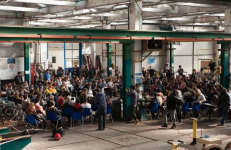
A common feature in every crisis situation, from the upheavals of the early 20th century to the neo-liberal re-structurings of the late 20th century, is the emergence of workers’ control – workers organising to take over their workplaces in order to defend their jobs and their communities.
Dario Azzellini in: Latin American Utopias: Past and Present, Edited by Juan Pro
“The Commune in Venezuela: A Utopian Prefiguration”
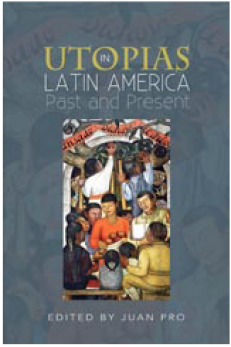
In an age in which fears about the future predominate (in the form of dystopias, ecological catastrophes and terrifying Sci-Fi scenarios), utopia is reappearing as the bearer of hope for the fate of humanity. Latin America has historically been a fertile ground where utopian projects, movements and experiments could take root and thrive, and this constitutes one of the region's major contributions to world history.
Bilbao resucita a Karl Marx
Entrevista El Salto: “La democracia tiene que estar adaptada a los diferentes lugares”
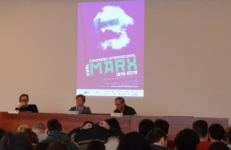
Bilbao se tiñó de rojo la semana pasada, y esta vez la culpable no fue ninguna afición visitante, sino la vuelta de uno de los clásicos. Los días 1, 2 y 3 de marzo la capital vizcaína acogió el Congreso Internacional Karl Marx, celebrado por el bicentenario de su nacimiento y organizado por el grupo de investigación Parte Hartuz y el Departamento de Ciencia Política y de la Administración de la UPV-EHU, con el apoyo de la Universidad y la colaboración de Betiko Fundazioa y diversos agentes políticos, sociales y sindicales.
Venezuela: mit Kryptowährung gegen die Krise
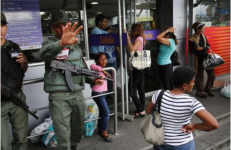
Seit der venezolanische Präsident Nicolás Maduro Anfang Dezember 2017 ankündigte, eine Kryptowährung Namens Petro einzuführen, wird das Thema in den Medien breit diskutiert. Mit der Eröffnung der Angebotsphase für den Privatkundenvorverkauf des Petro am 20. Februar, weitete sich die Diskussion noch einmal aus.
Prognosen zu italienischen Parlamentswahl
Interview Radio Lora München: "Eine Mehrheit für einen Irrwitz?"
Wie wird sich Italien nach der Wahl aufstellen? Dazu fragten wir den Autor und Politikwissenschaftler Dario Azzellini.
AutorInnen: Walter Heindl
Stiamo andando verso un altro crollo economico?
Non c'è dubbio che ci stiamo dirigendo verso un altro crollo economico, poiché il capitalismo è sempre diretto verso un altro crollo economico. È nella natura del capitalismo incrementare il capitale in eccesso e poi distruggerlo nuovamente attraverso crolli e guerre, al fine di far ripartire ancora una volta il processo di accumulazione. Dopo ogni crisi, come ci mostrano i dati storici, il ricco diventa più ricco e la concentrazione di capitale cresce. Da crollo a crollo, i cicli diventano più brevi e si accorciano via via che l'accumulazione di capitale in eccesso diventa più veloce.
Is democracy working?
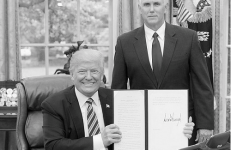
The term democracy is generally used as a synonym for liberal democracy, which is far from being the only possible form of democracy; indeed, it is even questionable whether liberal democracy was ever intended to be truly democratic. For centuries, liberals and democrats have been fierce opponents. Liberals only accepted democracy when it was limited to the political sphere, excluding it from the economic and social sphere. Liberal democracy became the new form of governance of the emerging production model (industrial capitalism).
¿Nos dirigimos hacia otra crisis económica?
Sin duda nos dirigimos a otra crisis económica. El capitalismo siempre se dirige a otra crisis económica. Es la naturaleza del capitalismo para aumentar el capital excedente para luego destruirlo de nuevo a través de una crisis o de la guerra, con el fin de reiniciar el proceso de acumulación, una vez más. Después de cada crisis, como muestran los datos históricos, los ricos se hacen más ricos y la concentración de capital crece.
Are we heading for another economic crash?
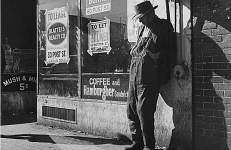
No doubt we are heading for another economic crash because capitalism is always heading for another economic crash. It is the nature of capitalism to increase surplus capital and then destroy it again through a crash or war, in order to restart the accumulation process once again. After every crisis, as historical data shows, the rich get richer and capital concentration grows. The cycles from crash to crash are becoming shorter as the accumulation of surplus capital becomes faster.
El movimiento comunero en Venezuela
Construyendo utopías concretas
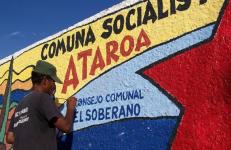
En el transcurso de la historia las utopías han jugado un papel importante en la construcción de alternativas sociales. En este artículo se analiza al mecanismo de autogobierno local venezolano de las comunas como prefiguración utópica o como “utopía concreta”. Se discuten diferentes conceptos marxistas y emancipadores de utopía conectándolos con el pensamiento latinoamericano, para demostrar cómo la prefiguración utópica es de considerar necesaria en los procesos de lucha revolucionaria.
über internationale selbstorganisierte Arbeitskämpfe
Interview Radio Corax: "The Class Strikes Back"
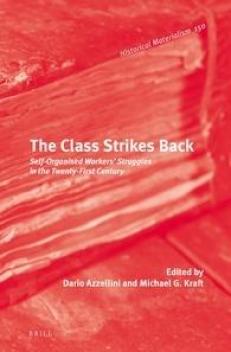
Wenn über Arbeitskämpfe gesprochen wird, dann geht es für gewöhnlich um Tarifverhandlungen und Warnstreiks - organisiert durch Großgewerkschaften wie die des DGB oder der CGT in Frankreich. Arbeitskampf kann aber auch anders aussehen - selbstorganisiert, fernab der Großgewerkschaften. Die Mittel selbstorganisierter Arbeitskämpfe sind radikaler. Betriebsbesetzungen, Blockadeaktionen und breite politische öffentliche Kampagnen die über die Sphäre der Arbeit hinaus gehen zählen zu den Mitteln selbstorganisierter Arbeitskämpfe.
You are missing some Flash content that should appear here! Perhaps your browser cannot display it, or maybe it did not initialize correctly.
La participación en Venezuela: conquista orgánica de la clase y punto de choque entre administración y poder popular

A la llegada a la Presidencia de Hugo Chávez en Venezuela, a comienzos de 1999, se puso en marcha un proceso de transformación social profundo en ese país. Una de las características centrales del proceso está en que la transformación social y la resignificación del estado son planteados como una construcción a dos bandas (Zibechi 2006, 206): Desde el estado y organizaciones de izquierda de tipo tradicional y desde movimientos populares y la sociedad organizada.
Análisis de las elecciones regionales en Venezuela 2017, 19 de Octubre 2017
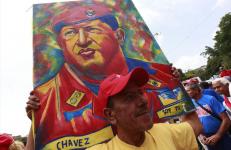
Venezuela - El chavismo gana 18 de los 23 gobiernos regionales, la oposición 5. El PSUV y los partidos aliados gobernantes ganaron en los estados de Amazonas, Apure, Aragua, Barinas, Bolívar, Carabobo, Cojedes, Delta Amacuro, Falcón, Guárico, Lara, Miranda, Monagas, Sucre, Trujillo, Yaracuy y Vargas. La alianza opositora MUD ganó 5 estados: el partido Acción Democrática (AD) ganó Anzoátegui, Mérida, Nueva Esparta y Táchira; Primero Justicia ganó el estado fronterizo petrolero estratégico Zulia en el noroeste.
Das Ergebnis ist ein großer Sieg für den Chavismus und bringt ihn ‒ nachdem er drei Jahre lang mit dem Rücken zur Wand stand ‒ in eine Position der Stärke
Analyse der Regionalwahlen in Venezuela 2017, 19. Oktober 2017
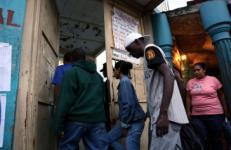
Venezuela - Chavismo gewinnt 18 von 23 Regionalregierungen, Opposition 5. Die regierende PSUV und alliierte Parteien gewannen in den Staaten Amazonas, Apure, Aragua, Barinas, Bolivar, Carabobo, Cojedes, Delta Amacuro, Monagas, Sucre, Trujillo, Yaracuy und Vargas. Das rechte Oppositionsbündnis MUD gewann 5 Staaten: Die Demokratische Aktion (AD) gewann Anzoátegui, Merida, Nueva Esparta und Táchira; Primero Justicia gewann den strategisch ölreichen nordwestlichen Grenzstaat Zulia.
Analysis regional elections in Venezuela 2017, October 19, 2017
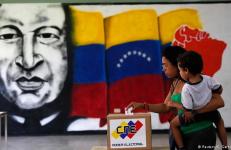
Venezuela - Chavismo wins 18 out of 23 regional governments, opposition 5. The governing PSUV and allied parties won in the states of Amazonas, Apure, Aragua, Barinas, Bolívar, Carabobo, Cojedes, Delta Amacuro, Falcon, Guarico, Lara, Miranda, Monagas, Sucre, Trujillo, Yaracuy, and Vargas. The opposition alliance MUD won 5 states: the Democratic Action (AD) party won Anzoátegui, Merida, Nueva Esparta, and Táchira; Primero Justicia won the strategic oil rich northwestern border state of Zulia.
L'adéu de Chávez i el futur del procés bolivarià. Traducción de "Venezuela With and Beyond Chavez"
Veneçuela amb Chávez i més enllà
“Chávez va ser un dels nostres”, diuen els pobres dels barris de Caracas, la gent de tota Amèrica Llatina, i els residents del Bronx, juntament amb els aproximadament dos milions de persones pobres als EUA que ara tenen calefacció gratuïta gràcies al govern de Chávez. Sean Penn va dir a Chávez: “Avui el poble dels Estats Units ha perdut un amic que mai va saber que tenia. I les persones pobres de tot el món han perdut a un campió”. Són dies tristos.
Venezuela - wie geht es weiter?
In Venezuela gibt es seit August diesen Jahres eine verfassungsgebende Versammlung. Das südamerikanische Land wird seit über einem Jahr von massiven Protesten sowie Gewalt auf den Straßen gebeutelt und leidet darüber hinaus unter den Sanktionen südamerikanischer Länder und der USA. Wie es momentan in Venezuela aussieht und wie sich die Staatskrise entwickelt, darüber hat mein Kollege mit einem Politikwissenschaftler gesprochen.
https://www.freie-radios.net/85270
You are missing some Flash content that should appear here! Perhaps your browser cannot display it, or maybe it did not initialize correctly.
La Venezuela del pueblo. Control obrero, cooperativas y comunas.
Los análisis sobre Venezuela se suelen concentrar en las políticas de gobierno y –hasta el 2013 – en la igura de Chávez. Hasta la mayoría de los autores que apoyan el proceso bolivariano han prestado poca atención a la construcción popular desde abajo. En este artículo se analizan la dinámica del movimiento para el control obrero, las cooperativas y su conexión con las Comunas como forma avanzada de autogobierno local.
Ein Thesenpapier
ALBA – eine alternative regionale Allianz?
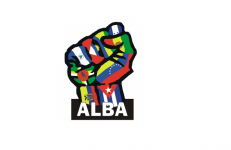
Die voranschreitende Globalisierung hat als Gegentendenz verschiedenartige regionale Integrationsbestrebungen hervorgebracht. Aus Sicht der europäischen Linken ist die Bolivarianische Allianz für die Völker unseres Amerikas (ALBA) interessant, weil sie regionale Zusammenarbeit und Integration völlig anders organisiert als alle anderen regionalen Allianzen.
